Key takeaways:
- Understanding communication involves recognizing elements like sender, message, and feedback, with context significantly influencing effectiveness.
- Cultural roots shape identity, enhance empathy, and foster deeper connections through shared experiences and storytelling.
- Exploring personal heritage and family history promotes a sense of belonging and enriches present interactions.
- Engagement with cultural communities and storytelling builds connections, opens avenues for vulnerability, and nurtures relationships across diverse backgrounds.
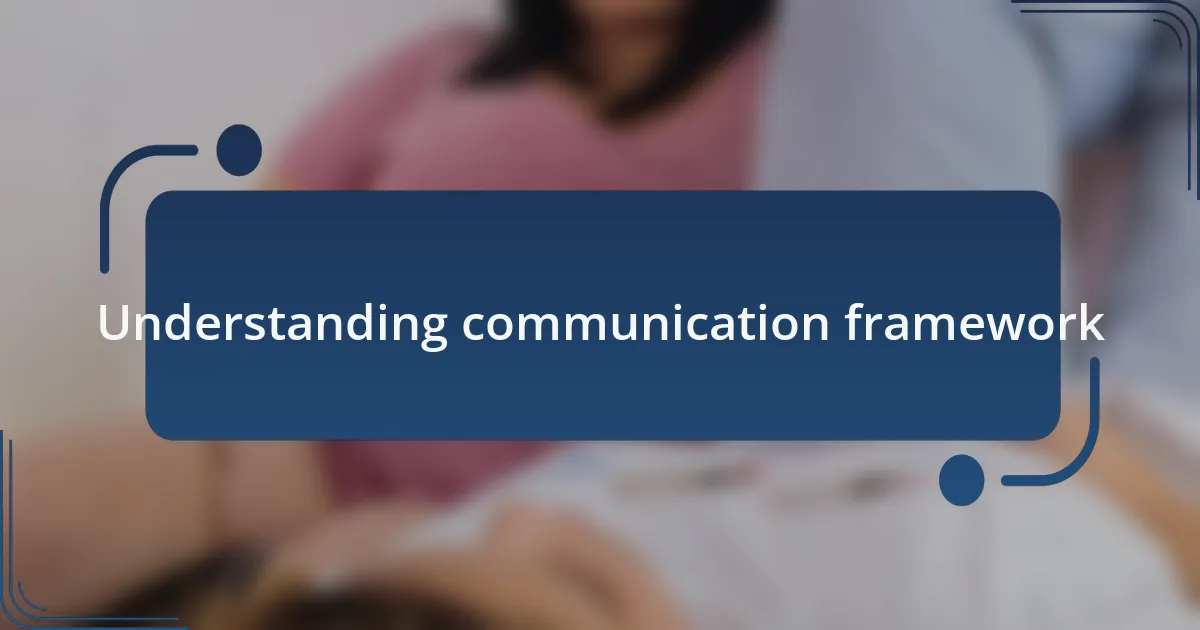
Understanding communication framework
Understanding a communication framework starts with recognizing its components: sender, message, medium, receiver, and feedback. Each element plays a crucial role in how effectively we exchange information. Have you ever noticed how a simple text can convey so much depending on the emojis used? It’s fascinating how communication nuances can impact meaning.
From my experience, I’ve often found that the context in which I communicate shapes the message. For instance, sharing a personal story at a gathering can create a warm connection, while the same story might feel flat over email. This distinction highlights how our surroundings and the chosen medium greatly affect our communication effectiveness.
Reflecting on my interactions, I’ve learned that active listening is a vital part of any communication framework. It’s one thing to speak, but how often do we truly hear what others are saying? I remember a conversation where I paused and reflected on the other person’s emotions—they felt understood, and that built instant rapport between us. Such moments remind me how deeply intertwined listening and understanding are in effective communication.
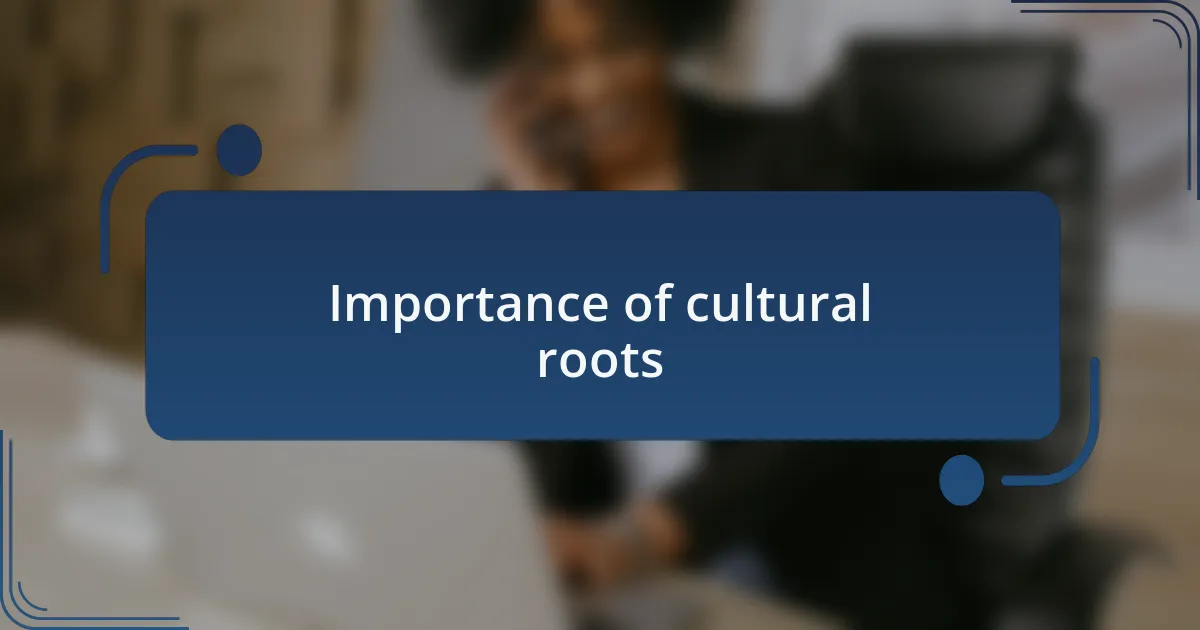
Importance of cultural roots
Cultural roots are the foundation of our identity, shaping how we perceive the world and communicate with others. I realize that my own heritage influences my interactions, often guiding my values and behaviors. For instance, when I engage in conversations about family traditions, I notice how they evoke strong emotions and resonate with others who share similar experiences.
Understanding cultural roots also enhances empathy and connection in communication. When I learned about my grandparents’ struggles and triumphs, it deepened my appreciation for their sacrifices. This awareness allows me to relate more profoundly to others’ stories, fostering a sense of shared humanity. Have you ever considered how your background colors your conversations and relationships?
Moreover, acknowledging my cultural roots has fundamentally enriched my understanding of different perspectives. I remember diving into a community event that celebrated diverse traditions. Engaging with people from various backgrounds opened my eyes to the rich tapestry of experiences that inform their communications. This not only broadened my worldview but also made me more thoughtful and intentional in my dialogues.
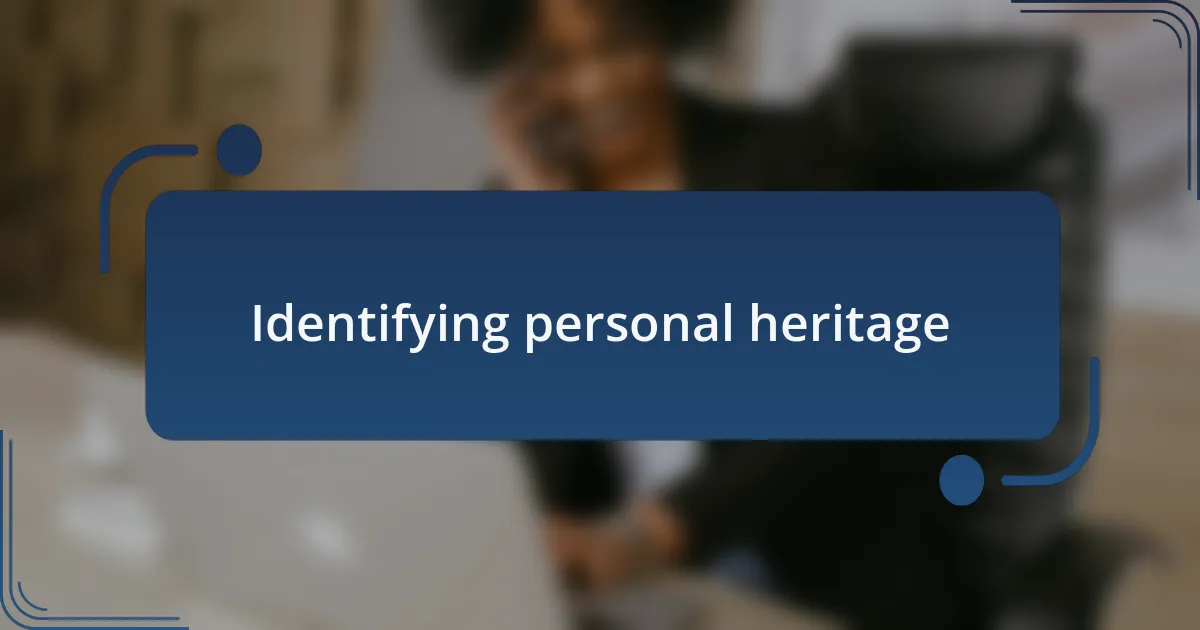
Identifying personal heritage
Identifying personal heritage can often feel like peeling back layers to uncover fascinating stories. I remember the day I stumbled upon my family tree; it felt like unlocking a door to a hidden world. Each name, each date revealed a fragment of history that connected me to a past I had scarcely acknowledged.
Reflecting on my family’s origin stories has been both enlightening and emotional. For example, my grandmother often shared tales of her childhood in a small village, detailing the customs and celebrations that filled her youth. Listening to her stories sparked a deep curiosity within me. I found myself asking, how do these experiences shape my own narrative? It became evident that each family anecdote was a building block of my own identity.
Moreover, exploring my heritage taught me the importance of cultural continuity. After attending a family reunion, I was overwhelmed by a sense of belonging. It struck me how these gatherings are more than mere social events; they are vital connections to our shared history. I began to wonder if we all could benefit from such reflections on our pasts. How might understanding our roots enrich our present and guide our future interactions?
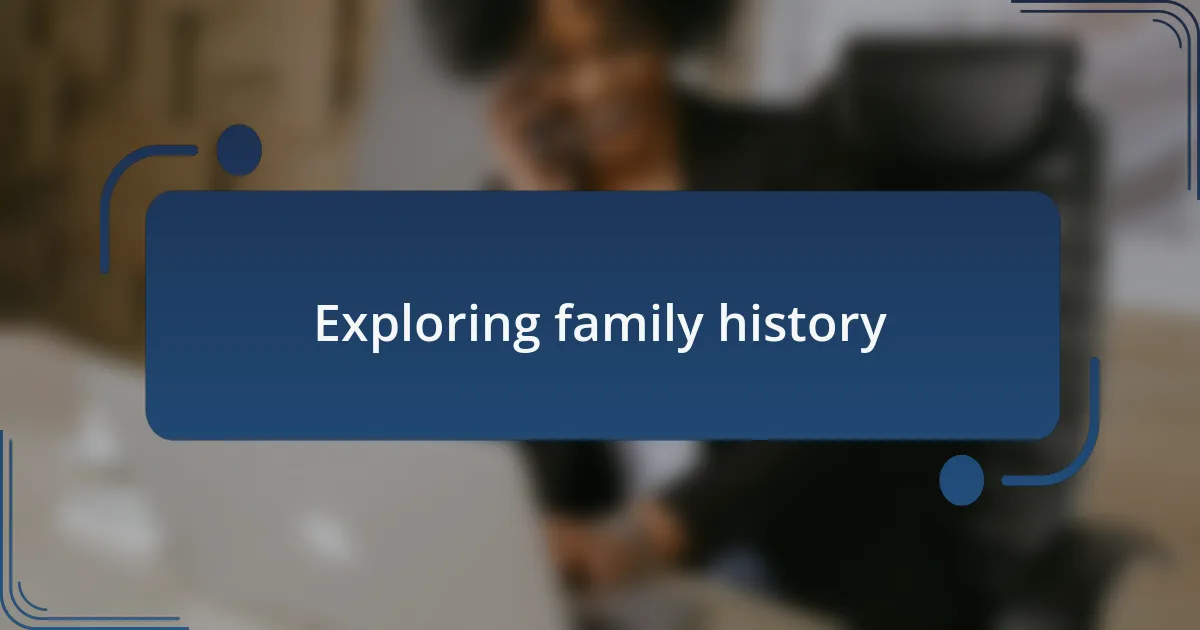
Exploring family history
Unearthing my family’s history was like piecing together an intricate puzzle. During one particularly rainy afternoon, I sat with a dusty box of old photographs that belonged to my father. Flipping through those images, I was struck by familiar faces, their smiles echoing in my own. Each photo, seemingly mundane, turned into a portal—each captured moment shared snippets of lives lived long before my time.
I vividly recall a conversation I had with my aunt about our family’s migration patterns. She recounted the challenges they faced while seeking a better life, and in doing so, I recognized the resilience woven into our lineage. Listening to her evoke such vivid memories made me question, how do these trials and triumphs echo in my own life? The stories she shared not only honored our ancestors’ struggles but also illuminated the values I cherish today.
Delving into family history often brings unexpected emotions to the surface. One day, while reciting our family’s history to my close friends, I realized I was sharing more than just facts; I was sharing our collective spirit. This dialogue made me ponder, how can these narratives shape our understanding of who we are in today’s world? As I explored these connections, I understood that embracing our family history is not just about remembering the past—it’s about enriching our present and informing our future interactions with each other.
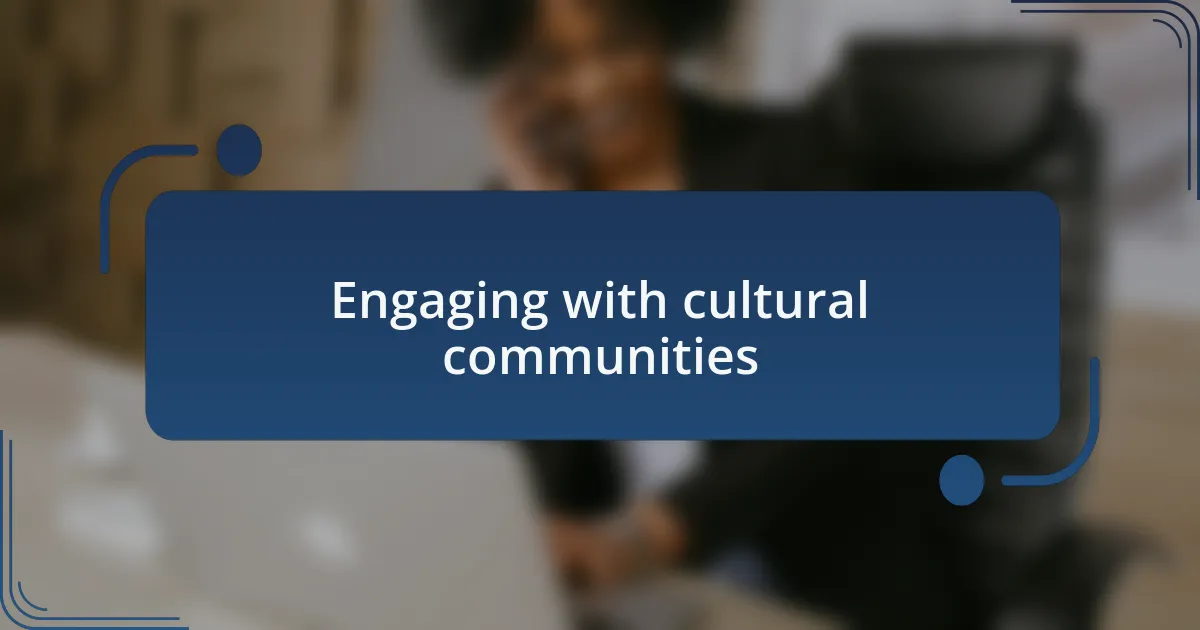
Engaging with cultural communities
Engaging with cultural communities is a powerful way to deepen our understanding of heritage. I remember attending a local festival that celebrated traditions from my family’s homeland. As I watched dancers in vibrant costumes twirl to the rhythmic beats of traditional music, I felt an overwhelming sense of belonging. It made me wonder—how can immersing ourselves in such vibrant communities help us reconnect with our roots?
Participating in workshops where artisans showcased their crafts gave me a glimpse into the rich skills passed down through generations. During one session, I tried my hand at pottery, guided by an elderly artisan who shared tales of his ancestors. His quiet pride resonated deeply with me, prompting the question: how much do these crafts reflect the identity of a culture? It’s clear to me now that these shared activities create a bridge between the past and present, fostering connections that anchor us in our identities.
I find that engaging with cultural communities also invites a wealth of perspectives that challenge our views. When I volunteered at a community center hosting language classes, I met immigrants eager to share their stories. Their experiences opened my eyes to the nuances of cultural identity in today’s world and led me to think: how can we create more spaces to celebrate diversity? This experience taught me that these interactions are not just about learning; they are about building relationships that enrich our lives and foster mutual respect.
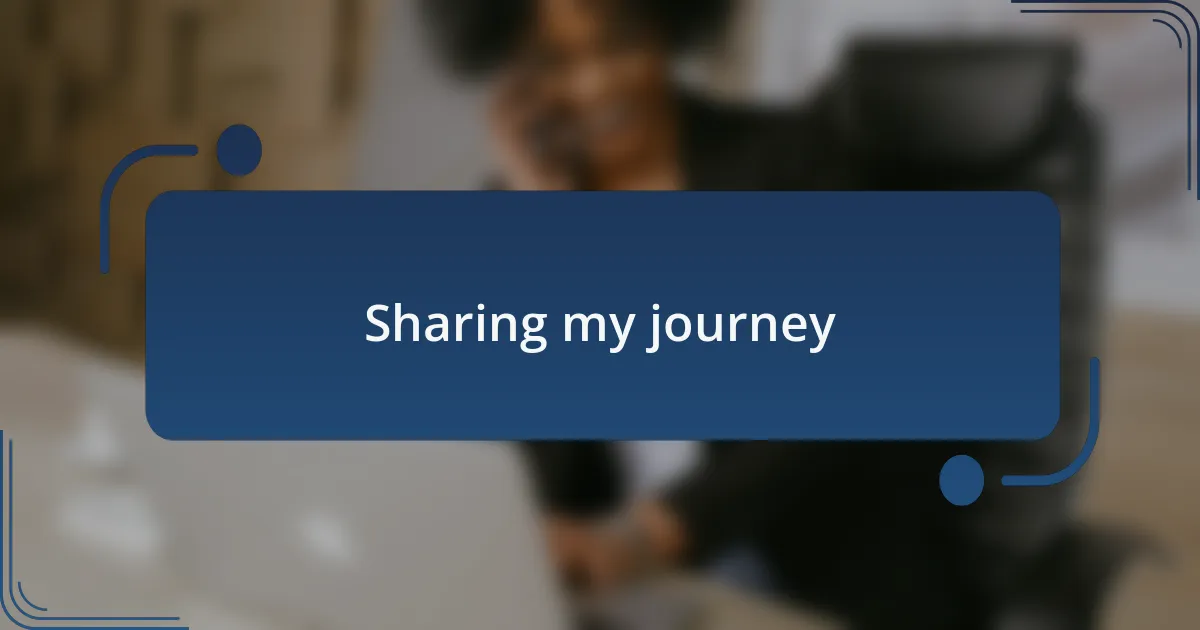
Sharing my journey
Sharing my journey has been a tapestry of moments stitched together by discovery and connection. I recall a particularly poignant evening spent with an elder from my community who recounted stories of her life as a young girl in another country. Listening to her reminiscences, I found myself captivated by her laughter and tears, realizing how personal histories are often intertwined with collective narratives. What does it mean to carry these stories forward?
As I delved deeper into my cultural roots, I began to document my family’s oral history, using interviews and handwritten notes. There was something incredibly fulfilling about preserving these tales, feeling like a guardian of memories that could otherwise fade away. This process left me pondering—how can storytelling become a means of healing for those of us navigating complex identities?
Through social media, I’ve shared snippets of my journey, and the responses have been heartwarming. One post about a family recipe sparked a conversation that connected me with distant relatives whom I had never met. Their enthusiasm reaffirmed my belief that sharing our unique experiences can resonate with others. Who knew that our traditions could act as threads pulling us closer together, even across vast distances?
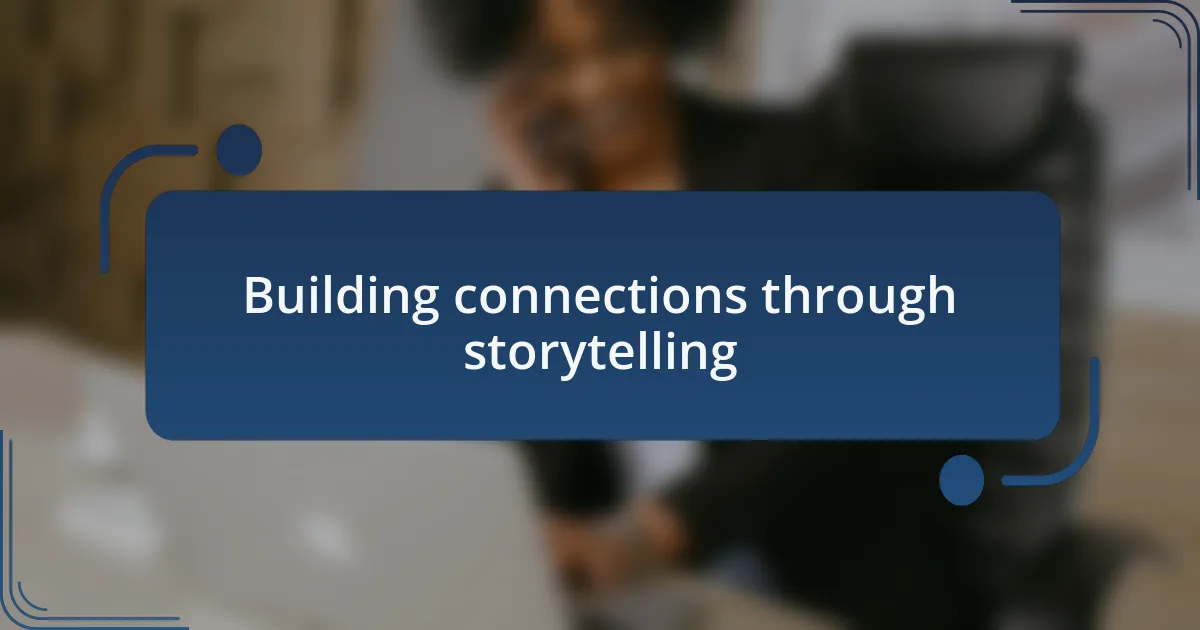
Building connections through storytelling
Storytelling has a remarkable ability to forge connections that often feel invisible yet profoundly impactful. I remember attending a cultural festival where a storyteller captivated the audience with tales of traditions from her homeland. As she spoke, I felt a magnetic pull—not just to her words but to the shared experiences we all had, regardless of our backgrounds. How powerful is it to realize that a simple story can weave together diverse lives and create a sense of belonging?
During family gatherings, I often see storytelling play a central role in bridging generations. My grandmother, with her animated gestures and rich voice, brings our family history alive, making us feel connected to our ancestors. Her stories reveal lessons learned and hardships faced, inviting us to reflect: how can we ensure these narratives endure in our fast-paced world? It’s a beautiful realization that every shared memory can spark a deeper understanding among us, nurturing our roots even as we grow in new directions.
I also find that storytelling can open avenues for vulnerability and empathy. Once, I shared a challenging chapter of my life during a community event, which encouraged others to share their experiences. In that moment, we created a web of support and understanding that transcended individual struggles. Isn’t it remarkable how some stories can inspire others to find their voice, fostering connections that help us heal together?